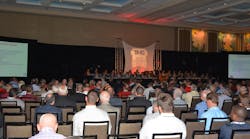How fleets can craft maintenance and technology solutions
Constant attention to detail and carefully crafted solutions are vital when it comes to meeting the demands of today’s world of transportation. Shipper expectations, government regulations, technological advances and CSA (Compliance, Safety, Accountability) compliance issues offer challenges that fleets must overcome. Fleets must scrutinize the investments they make in their operations and vehicle maintenance programs.
Many fleets turn to the Technology & Maintenance Council (TMC) to help them make savvy business decisions on maintenance and spec’ing issues.
That is why TMC officials feel the theme for this year’s annual fall meeting, Crafting Maintenance and Technology Solutions, is appropriate.
That meeting is set for Sept. 18 to 22 at the Raleigh Convention Center in Raleigh, N.C. It is being held in conjunction with the TMCSuperTech2016, the National Technician Skills Competition. This is an event designed by TMC to determine the industry’s top technicians through a variety of troubleshooting tests and skills challenges.
Made up of a broad collection of experienced fleets, equipment suppliers and service providers, TMC (http://www.trucking.org/Technology_Council.aspx) is the only industry association that is focused solely on truck technology and maintenance to help improve trucking efficiencies across North America. TMC is a technical council of America Trucking Associations (www.trucking.corg) – the largest national trade association for the trucking industry.
TMC’s 2016 Fall Meeting offers a comprehensive collection of educational sessions designed to keep fleets’ maintenance personnel up to date on vehicle technology.
TECHNICAL SESSIONS
Three different technical sessions aimed to bring technicians up to speed on a variety of topics will be held Sept. 20, 21 and 22. Each session will 90 minutes in duration.
THE EVOLUTION OF ENGINE COOOLANTS
Over recent years, engine coolants have changed and have become more diverse. With the introduction of exhaust gas recirculation (EGR) technology, more demand is placed on the engine’s coolant system than before. Coolant system components also have changed, creating some OEM factory fill challenges and changes.
Knowing the difference between today’s coolant’s diversity of technologies and colors is vital to protect the coolant system.
Attendees at this session will learn what technologies are being used for factory fills by truck manufacturers and why their choices are important to a fleet’s operation. Panelists also will address coolant identification, labeling, testing, color (on the truck and in the bottle), as well as offer recommendations for coolant maintenance.
Successful conversion procedures from conventional OAT (organic acid technology) to OAT-NF (Nitrite Free) coolants will be described from the fleet and supplier perspective.
A DEEP DIVE INTO VEHICLE AND COMPONENT CORROSION
For years, aggressive corrosion caused by various ice-clearing chemicals has been a maintenance problem for many equipment users. The use of magnesium chloride- and calcium chloride-based products is associated with increased incidence of corrosion.
During TMC’s 2016 Annual Meeting, which was held earlier this year, the group’s Corrosion Control Action Committee presented an overview of TMC’s comprehensive manual that addresses various aspects of vehicle corrosion. Now elevated to study group status, the new S.17 Corrosion Control Study Group will present an in-depth look into corrosions issues. Fleet and supplier panelists will present case studies of specific corrosion issue.
Attendees at this session will learn the latest strategies for dealing with vehicle corrosion through live demonstrations.
RETENTION FAILURE ANALYSIS: PRACTICAL STRATEGIES FOR MANAGING TECHNICIAN TURNOVER
Because a major concern for many fleets is recruiting and retaining quality technicians, TMC’s Professional Technical Development Committee (PTDC) will present an in-depth look at several factors impacting this issue and what fleets can do to effect positive changes within their organizations.
Among other things, panelists will:
- Address what needs to be done to attract and integrate millennials into the workforce.
- Look at strategies to effectively manager turnover due to retirements.
- Offer advice on to use education, training and other tools to reduce technician turnover.
- Address generational diversity and strategies for dealing with ageism in fleet operations.
- Discuss how technicians are prepared in trade school and how that compares to industry needs.
STUDY GROUP SESSIONS
TMC Study Groups are standing committees that identify problems and challenges facing motor carriers and other truck equipment users. These groups, which are long-term in nature, study a specific sector of truck technology or management.
Study group meeting taking place at TMC’s 2016 Fall Meeting include:
48V ELECTRICAL SYSTEMS: HOW DO WE GET THERE?
This meeting will consider the advantages of migrating to 48V electrical systems and what kind of sustained commitment from the industry is necessary to adopt them. Presenters will share findings from a new TMC information report on the subject, and engineers from the industry will explore this transition.
TIRE REPAIR SPECIFICATIONS TO REDUCE ROADSIDE FAILURES
This session will focus on advances and changes in truck tire repair procedures that are designed to reduce failures. Attendees will be shown how to set repair specifications, analyze scrap tire repair failures, inspect repair providers and limit exposure to repair failure downtime.
NEXT GENERATION ENGINE OILS (PC-11): WHAT IT MEANS FOR 2017
The latest updates on the upcoming oil specification will be shared during this session. Subjects to be covered include:
- Details of the new formulations.
- Guidance in identifying new oil classes.
- How new engine design changes prompted the need for new oil packages.
- What to do in case new formulations are accidently mixed.
IMPLEMENTING EFFECTIVE PREVENTIVE MAINTENANCE INSPECTION STRATEGIES
This session will offer a live demonstration of TMC’s recently updated Recommended Practices on Preventive Maintenance Inspection (PMI). Members of TMC’s Educator Committee will walk attendees through the new PMI sequence and provide tips for improving PMI programs. Attendees also will receive a complimentary copy of one of TMC’s new PMI manuals.
ELECTRONIC STABILITY CONTROL: SOONER OR LATER, YOUR FLEET WILL HAVE IT
The new Federal Motor Vehicle Safety Standard (FMVSS) 136 will require Electronic Stability Control (ESC) on truck tractors and certain buses with a GVWR of more than 26,000 lbs with the hopes of preventing up to 2,329 crashes, 858 injuries and 60 fatalities annually. Those in attendance at this session will learn what to expect from ESC technology when it comes to operation, maintenance, repair and diagnostics.
ELECTRIFICATION OF TRAILERS, SHOREPOWER AND HOW TO SET IT ALL UP PROPERLY
TMC’s S.7 Trailers, Bodies and Material Handling Study Group is developing a recommended practice (RP) on how to specify, purchase and install plug-in electrical connection infrastructure with a focus on safety and interoperability issues. Panelist at this session will cover hardware, safety, cord management and communication options, in addition to systems required for charging pallet jacks and trailer unloading systems. Attendees will also hear about what recommendations are being proposed for electric-powered transport refrigeration units and how it could impact operations.
IMPLEMENTING GREEN ARCHITECTURE FOR FLEET OPERATIONS
Some businesses, including trucking companies, are recognizing a need for green building techniques in planning future property investments. Attendees at this session will learn how fleets can incorporate green architecture principles to reduce their carbon footprint and save money. Presenters will explain various aspects of developing a sustainability plan or report.
ELECTRONIC LOGGING DEVICES: OPERATIONAL AWARENESS
Representatives from the Federal Motor Carrier Safety Administration (FMCSA) will provide insight on the process of implementing the Electronic Logging Device (ELD) mandate. Panelists will include fleet representatives who will discuss implementation strategies, important operational considerations and training issues. There will also be an update on TMC’s development of a RP on electronic onboard recorders (EOBRs) and ELDs.
HYDRAULIC SYSTEM COMPONENT FAILURE ANALYSIS
This session will address common causes for hydraulic pump and power source failures, along with measures to prevent and correct these issues. Panelists also will offer failure analysis recommendations based on RP 1514.
Complete details regarding TMC’s 2016 Fall Meeting can be found at http://www.trucking.org/Technology_Council.aspx or by calling 703-838-1763.




